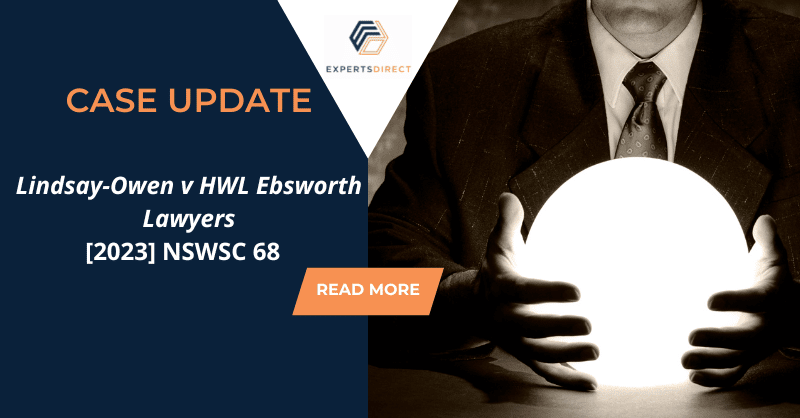Lindsay-Owen v HWL Ebsworth Lawyers [2023] NSWSC 68
In this case, an expert’s opinion predicting the likely commercial decisions of a financial institution and a hypothetical joint venture party was rendered inadmissible by the court.
The plaintiffs sought damages from their former solicitors for negligence and breach of retainer in connection with advice concerning their acquisition and development of land in Western Sydney, and the preparation of a joint venture agreement (JVA)t.
At the time that the JVA was executed, the plaintiffs had a loan facility with the National Australia Bank (the bank) for approximately $20M secured by mortgage over the land. One of the plaintiffs defaulted under the JVA, and the joint venture partner in turn sought to sell the land.
The plaintiffs engaged Mr G, an “expert witness property financier”, to support their contention that the bank would have been prepared to accommodate the delays that might have been occasioned by the time it would theoretically have taken the plaintiffs to either amend the draft JVA or to find an alternative joint venture partner.
On the question of what the bank would have done in 2010, Harrison J held that Mr G’s evidence was inadmissible because his report did not satisfy the requirements of s 79 of the Evidence Act 1995 (NSW) (the Act). Mr G expressed opinions about what the bank might have done, about what its state of mind was, and even about what an alternative joint venture partner might have done. Harrison J ruled that these opinions were not evidence of banking practice or any other fields of expertise based on specialised knowledge. [141]
The plaintiffs also adduced evidence from Mr D, a Certified Practising Valuer, to prove causation of some loss. The defendants objected to Mr D’s evidence on the grounds that there was no relevant field of expertise for the questions put to him.
The court rejected Mr D’s report to the extent that he purported to answer a question about a hypothetical joint venture. It was ruled that portion of the report dealing with the probabilities of what might occur was inadmissible. The court found there is no identified field of training, education, or experience that would permit of the expression of an admissible opinion about what would have been the probable outcome from a range of posited scenarios. [151] Mr D did not have expertise in foretelling or predicting the likely commercial decisions of a hypothetical joint venture party. [152]
The defendant’s further contended that Mr D’s conclusions in answering the question of the cashflows the joint venture have been likely to receive from the development were unexplained, contrary to the requirements of Makita v Sprowles (2001) 52 NSWLR 705, the many cases that have applied the Makita principles, and s 79 of the Act.
Harrison J found that Mr D was qualified to express opinions on possible gross realisations and development costs associated with the development. [201] The modelling of Mr D’s scenarios was clearly based wholly and substantially on his experience, which has been summarised and detailed in his report. [203] While there were gaps in Mr D’s reasoning, these did not go to admissibility. [204]
Harrison J ruled that predictions about the future are not illegitimately speculative or hypothetical if they are based on a relevant degree of education, training, and experience, and Mr D’s answers to the second question fell under this category. [207] The court concluded that Mr D’s opinions about various scenarios were relevant and admissible.
Key takeaways
- Opinions that are not evidence of an expert’s field of expertise based on specialised knowledge are not admissible.
- Gaps in reasoning in an expert’s report will not necessarily render it inadmissible if it can be demonstrated that the expert’s opinion is wholly or substantially based on their experience, and that experience is set out in the report.
- Predictions about the future are not illegitimately speculative or hypothetical if they are based on a relevant degree of education, training, and experience.
Read the full decision here.
